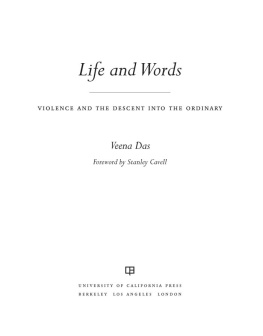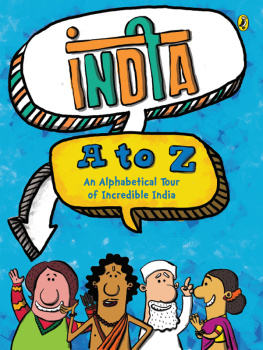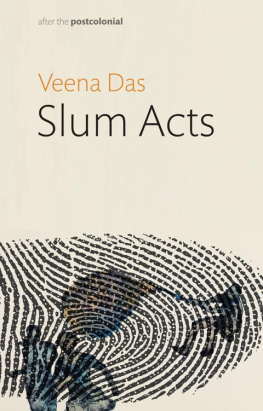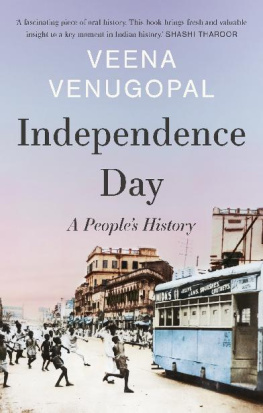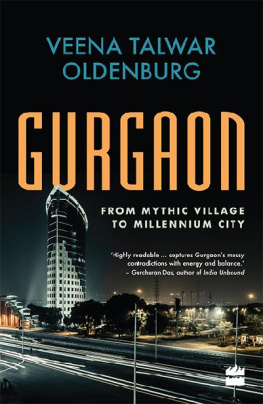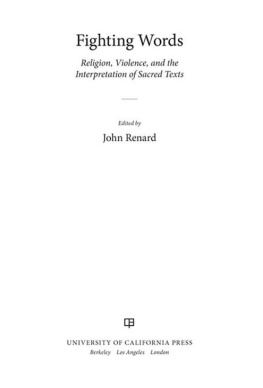Das Veena - Life and words violence and the descent into the ordinary
Here you can read online Das Veena - Life and words violence and the descent into the ordinary full text of the book (entire story) in english for free. Download pdf and epub, get meaning, cover and reviews about this ebook. City: Berkeley;India, year: 2007, publisher: University of California Press, genre: Religion. Description of the work, (preface) as well as reviews are available. Best literature library LitArk.com created for fans of good reading and offers a wide selection of genres:
Romance novel
Science fiction
Adventure
Detective
Science
History
Home and family
Prose
Art
Politics
Computer
Non-fiction
Religion
Business
Children
Humor
Choose a favorite category and find really read worthwhile books. Enjoy immersion in the world of imagination, feel the emotions of the characters or learn something new for yourself, make an fascinating discovery.
- Book:Life and words violence and the descent into the ordinary
- Author:
- Publisher:University of California Press
- Genre:
- Year:2007
- City:Berkeley;India
- Rating:3 / 5
- Favourites:Add to favourites
- Your mark:
- 60
- 1
- 2
- 3
- 4
- 5
Life and words violence and the descent into the ordinary: summary, description and annotation
We offer to read an annotation, description, summary or preface (depends on what the author of the book "Life and words violence and the descent into the ordinary" wrote himself). If you haven't found the necessary information about the book — write in the comments, we will try to find it.
Das Veena: author's other books
Who wrote Life and words violence and the descent into the ordinary? Find out the surname, the name of the author of the book and a list of all author's works by series.
Life and words violence and the descent into the ordinary — read online for free the complete book (whole text) full work
Below is the text of the book, divided by pages. System saving the place of the last page read, allows you to conveniently read the book "Life and words violence and the descent into the ordinary" online for free, without having to search again every time where you left off. Put a bookmark, and you can go to the page where you finished reading at any time.
Font size:
Interval:
Bookmark:

Life and Words
A

BOOK
The Philip E. Lilienthal imprint honors
special books in commemoration of a
man whose work at University of
California Press from 1954 to 1979 was
marked by dedication to young authors
and to high standards in the field of
Asian Studies. Friends, family, authors,
and foundations have together endowed
the Lilienthal Fund, which enables
UC Press to publish under this imprint
selected books in a way that reflects the
taste and judgment of a great and
beloved editor.
Life and Words
_____________________
VIOLENCE AND THE DESCENT INTO THE ORDINARY
Veena Das
Foreword by Stanley Cavell

University of California Press, one of the most distinguished university presses in the United States, enriches lives around the world by advancing scholarship in the humanities, social sciences, and natural sciences. Its activities are supported by the UC Press Foundation and by philanthropic contributions from individuals and institutions. For more information, visit www.ucpress.edu.
Several chapters are revised versions of earlier essays, which are listed in the acknowledgments on pages 267269.
University of California Press
Berkeley and Los Angeles, California
University of California Press, Ltd.
London, England
2007 by The Regents of the University of California
Library of Congress Cataloging-in-Publication Data
Das, Veena.
Life and words : violence and the descent into the
ordinary / Veena Das ; foreword by Stanley Cavell.
p. cm.
Philip E. Lilienthal Asian studies imprint.
Includes bibliographical references and index.
ISBN -13, 978-0-520-24744-4 (cloth : alk. paper)
ISBN -10, 0-520-24744-2 (cloth : alk. paper)
ISBN -13, 978-0-520-24745-1 (pbk. : alk. paper)
ISBN -10, 0-520-24745-0 (pbk. : alk. paper)
1. ViolenceIndia. 2. IndiaHistoryPartition, 1947. 3. SikhsCrimes againstIndia. 4. RiotsIndiaHistory20th century. 5. SufferingIndia. 6. IndiaPolitics and government. 7. IndiaSocial conditions. 8. IndiaSocial life and customs. I. Title.
GN 635.i4d2662 2007
303.60954dc22 2006003041
Manufactured in the United States of America
15 14 13 12 11 10 09 08 07 06
10 9 8 7 6 5 4 3 2 1
This book is printed on New Leaf EcoBook 50, a 100% recycled fiber of which 50% is de-inked post-consumer waste, processed chlorine-free. EcoBook 50 is acid-free and meets the minimum requirements of ANSI/ASTM D 563401 (Permanence of Paper).
For
Saumya,Jishnu,and Sanmay
for their gift of love
and
Ranen
for the generosity of spirit with which he has
nourished our life together
Veena das speaks of her repeated (and even compulsive) reliance on Wittgenstein as playing a role in the philosophical friendship that has developed between us. Beyond the clear evidence for this observation, the truth of it, from my side of things, is further confirmed, if perhaps less clearly, in an early and in a late thought of mine, each expressing my sense of an anthropological register in Wittgensteins sensibility, thoughts not reflected in Wittgensteins well-known recurrence, in his later (or as the French put it, his second) philosophy, to imaginary tribes different from us. I would like to mark my pleasure in contributing prefatory words for Dass wonderful book Life and Words by putting those easily lost thoughts into words, into the world.
My early thought was directed to a passage in Philosophical Investigations that roughly sounds to me like a reflection on a primitive allegory of incipient anthropological work: Suppose you came as an explorer into an unknown country with a language quite strange to you. In what circumstances would you say that the people there gave orders, understood them, obeyed them, rebelled against them, and so on? The common behaviour of mankind is the system of reference by means of which we interpret an unknown language (206).
This may, as other moments in Wittgensteins text may, seem either too doubtful or too tame to be of much intellectual service. Common behavior seems quite unargumentative in referring to the behavior of salmon and mallards and anthropoid apes, not quite in referring to that of human beings. But lets turn the card over. Take it that the allegorical air comes rather from the fact that to ask a question of the form In what circumstances would you say...? is precisely Wittgensteins most obvious (ordinary language) procedure directed to and about us, about us as philosophers when we are, as we inevitably are, variously tempted to force our ordinary words to do what they, as they stand, will not do, disappointed by finitude. It is our language that is, or that we perpetually render, foreign to us. The point of the allegory would then be that the explorer coming into an unknown country with a strange language is a figure of the philosopher moved to philosophical wonder by the strangeness of the humans among whom he lives, their strangeness to themselves, therefore of himself to himself, at home perhaps nowhere, perhaps anywhere. (I have spoken of the Investigations as a portrait more specifically of the modern subject.)
Asking us either to find our behavior strange (seltsam), or not strange, is a familiar gesture in the Investigations, anticipated, for example, in Platos image of the everyday as a cave, and in Rousseaus fantasm of the first word (the first naming of the human other) as a giant, and in Thoreaus perception in the opening pages of Walden of his fellow townsmen as self-tormenting Bramins (Thoreaus spelling). The intersection of the familiar and the strange is an experience of the uncanny, an intersection therefore shared by the anthropologist, the psychoanalyst, and the Wittgensteinian (Socratic, Rousseau-like, Thoreau-like, etc.) philosopher. (Here an anthropological perspective is the counter to what is sometimes called, and disapproved of as, a humanist perspective, satisfied in its knowledge of what humanity should be. What I call Wittgensteins anthropological perspective is one puzzled in principle by anything human beings say and do, hence perhaps, at a moment, by nothing.)
This brings me to the second, later thought prompting the sense of Wittgensteins seeking perspective on his unknown culture. I once shared a podium to discuss, perhaps debate, Wittgensteins later views with a friend who is fully recognized as one of the most accomplished philosophers of our generation. In his introductory remarks he asked, in effect: Why is Wittgenstein content to accord the status of a culture or an imaginary tribe to virtually any group of strange creatures with apparently the sole exception of philosophers? When my turn to speak came I replied that for Wittgenstein philosophy is not a culture, not one among others. It is without (no matter how persistently it craves to have) a persistently accepted and evolving language of its own, retaining only some local terms that will be disputed and repudiated by other philosophers; houses of cards Wittgenstein will call its parade of discourses. The locale of its originating form of life is the singular human being dissatisfied with itself, a fate inherent, or say natural, within any civilized human society. We (moderns, philosophers) are likely often to accede to the idea that philosophy has become a profession like others, say, since its incorporation into the Western university curriculum over the past two and a half centuries. But that is something Wittgenstein fairly clearly finds as strange as it is familiar.
Font size:
Interval:
Bookmark:
Similar books «Life and words violence and the descent into the ordinary»
Look at similar books to Life and words violence and the descent into the ordinary. We have selected literature similar in name and meaning in the hope of providing readers with more options to find new, interesting, not yet read works.
Discussion, reviews of the book Life and words violence and the descent into the ordinary and just readers' own opinions. Leave your comments, write what you think about the work, its meaning or the main characters. Specify what exactly you liked and what you didn't like, and why you think so.

